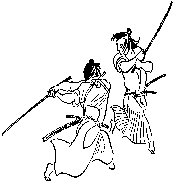Macro-Bushido: A Geoethical Consciousness
for an Info-Cultural Age
Martine Rothblatt, Ph.D.
page 2 of 9
The Principles of Bushido
Seven unique principles may be distilled from Bushido. These are labeled Rectitude, Courage, Benevolence, Politeness, Veracity, Honor and Loyalty. For all the centuries that the samurai were needed, these seven principles were a necessary and sufficient basis to hold the warrior class together. As noted above, they continue to animate the soul of Japan, perhaps providing an underlying explanation for the country’s unique success.
Rectitude means autonomously reaching a reasoned decision and sticking to it. Courage is taking one’s decision into action without regard to the personal consequences of that action. Courage without Rectitude is recklessness, whereas Rectitude without Courage is impotence.
Benevolence is empathizing with the feelings of others. Politeness means disciplining oneself to respect procedures that show equivalent respect for others. Veracity under Bushido stands for an absolute commitment to honesty, not merely as a good “means” to an end, but as the only honorable end. Politeness without Veracity or Benevolence is a facetious artifice. Veracity or Benevolence without Politeness, however, indicates the weakness of character typified by a desire to show superiority to others. Being polite to others, even to one’s enemy, shows that knowing truth or being aware of another person’s feelings does not make the other person less human.
The last two Bushido principles are Honor and Loyalty. Honor means doing nothing to disparage another’s good name, including their family’s reputation. Honor is the opposite of shame, and shame can arise from violating any of the Bushido principles. Loyalty is adherence or obeisance to a hierarchy of governance. Decisions should be made in accordance with a predictable, society-wide understanding of loyalties. There can be no Honor if Loyalty is not respected, nor can Loyalty be true if implemented dishonorably. True Loyalty requires obeisance to be carried out honorably.
A samurai might disagree with the feudal lord to whom he owed Loyalty. The duty of Loyalty did not mean that the lord owned the samurai’s conscience. To the contrary, proper Rectitude required the samurai to decide for himself what to do, even if ordinarily that simply meant following orders. If the orders seemed dishonorable to the samurai, then he was expected to try to dissuade his lord from the problematic course of action. If the contested order could not be changed, then the honorable course of action for the samurai was ritual suicide. In essence, he uses his own life to try to finally persuade his lord to avoid an erroneous course of action. Because he cannot carry out Loyalty with Honor, and he cannot be disloyal, the only honorable option is ritual suicide.
Weaponry is one last aspect of Bushido deserving of mention in this very brief overview. The samurai’s two swords, one long and one short, were critical to his role in life. The swords were the fundamental tools needed to perform the protector role that was the samurai’s raison d’etre (reason for being). At the time, no other tool could be used as ably and flexibly to carry out the duties of a warrior. The Bushido code of ethics presupposed tools designed for face-to-face combat.

Figure 2: Two samurais battle using long swords.